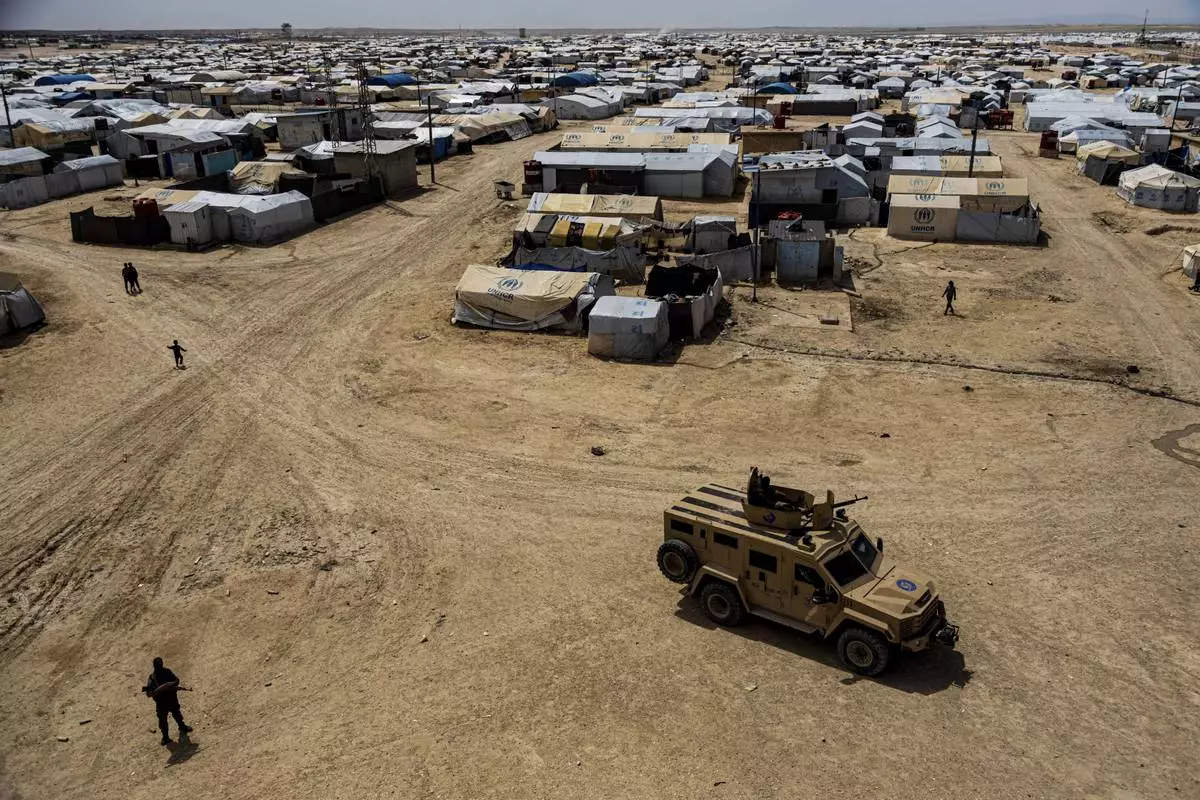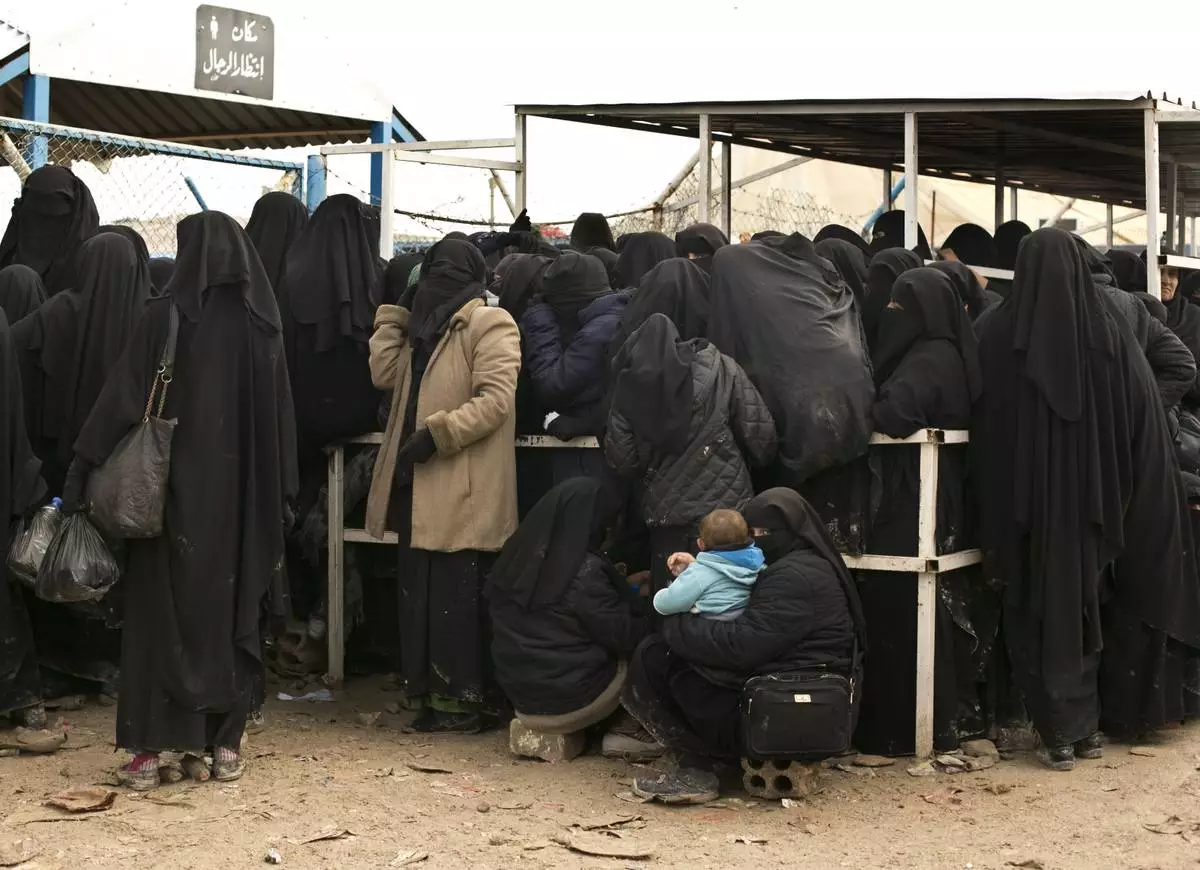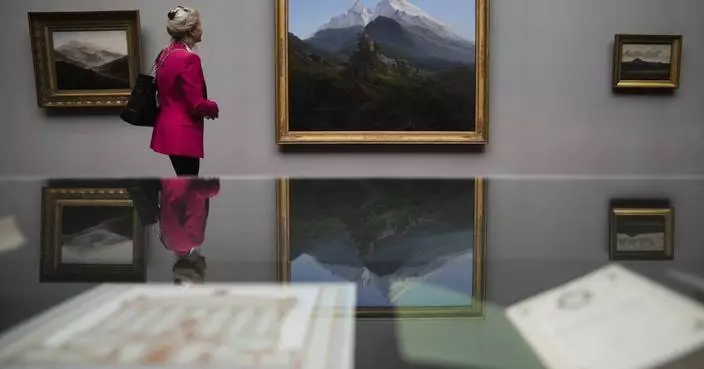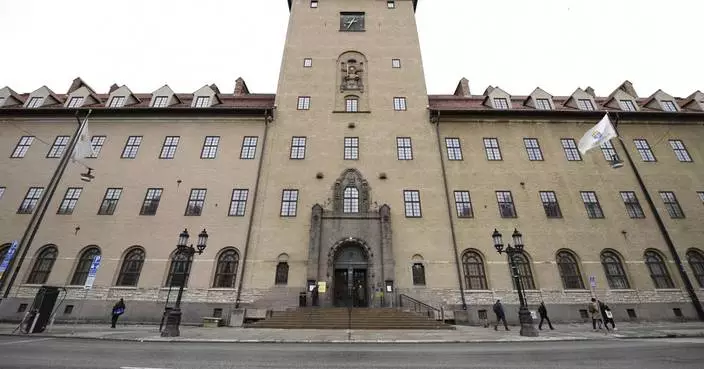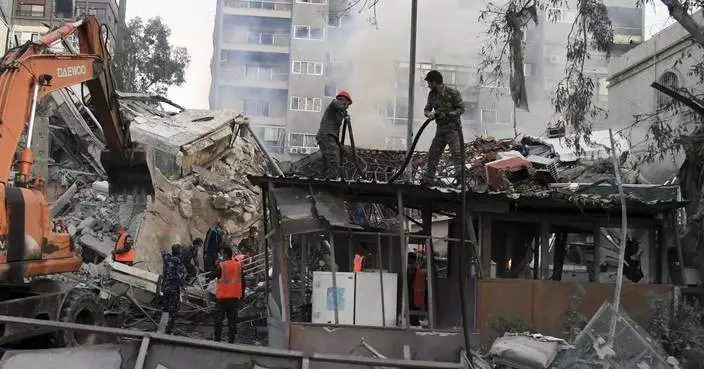For Syrians marking seven years of war, their country has never looked as helpless or fragmented.
President Bashar Assad has decimated the rebellion, thanks to massive military aid from Russia and Iran, but foreign powers have carved out zones of influence across the country. Hundreds of thousands of Syrians are trapped in besieged areas, and heavy fighting is underway in the suburbs of Damascus and in the north, where al-Qaida-linked militants are clashing with rival insurgents and Turkish troops are battling a Syrian Kurdish militia.
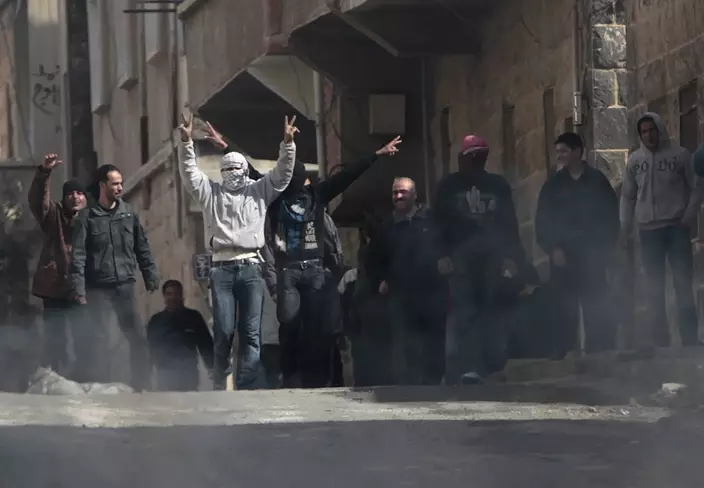
FILE - In this March 23, 2011 file photo, anti-Syrian government protesters flash victory signs as they protest in the southern city of Daraa, Syria. For Syrians marking seven years of war this week, their country has never looked as helpless, fragmented and abandoned by the international community.(AP Photo/Hussein Malla, File)
The violence has accelerated even as the United States, Russia, Iran and Turkey worked diplomatic tracks to broker local truces and freeze the lines of conflict over the last year. Those efforts now appear to have been aimed at mapping out areas of influence.
"I don't even see Syria anymore," said Zaina Erhaim, a Syrian journalist who left the country in 2016 and now lives in London.
"It's called Syria on the map. But if you can think about an ordinary Syrian who wants to go from Daraa to Idlib, can you think about how many countries or nationalities he's going to be passing to reach there?" she asked.
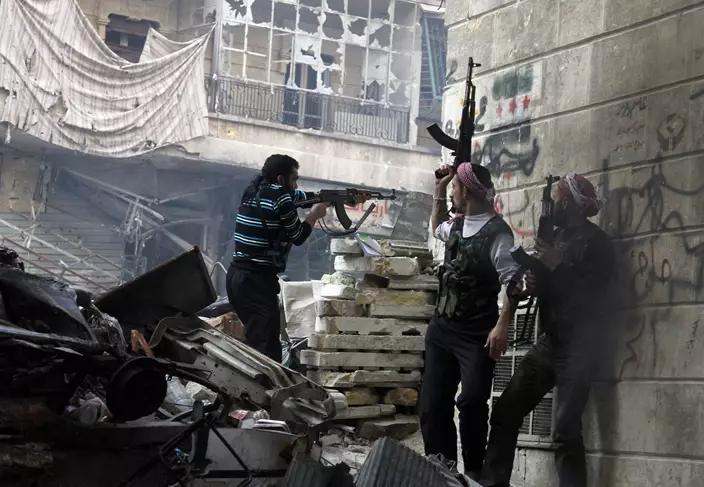
FILE - In this Dec. 29, 2012 file photo, Free Syrian Army fighters fire at enemy positions during heavy clashes with government forces, in the Salaheddine district of Aleppo, Syria. For Syrians marking seven years of war this week, their country has never looked as helpless, fragmented and abandoned by the international community. (AP Photo/Abdullah Al-Yasin, File)
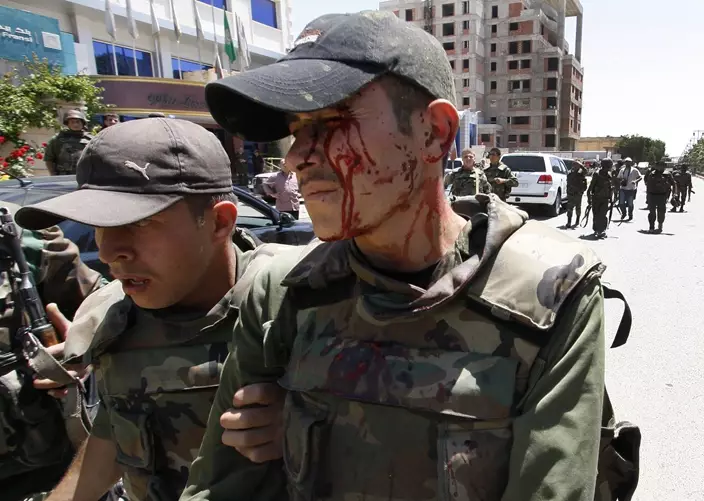
FILE - In this May 9, 2012 file photo, an injured Syrian army soldier, wounded by a roadside bomb, is helped by a comrade, in Daraa city, southern Syria. For Syrians marking seven years of war this week, their country has never looked as helpless, fragmented and abandoned by the international community. (AP Photo/Muzaffar Salman, File)
A short list would include the remnants of Syria's Western-backed opposition, Lebanon's Hezbollah and other Iran-backed Shiite fighters from as far away as Afghanistan, Syrian troops, Russian pilots, al-Qaida-linked jihadis, U.S.-allied Kurdish forces and Turkish tank crews.
Nearly half a million people have been killed in Syria since Arab Spring protests erupted in 2011, after security forces arrested a group of teenagers who scrawled anti-Assad graffiti on a wall in the southern city of Daraa.
A demonstration calling for reforms in Damascus' Old City on March 15 is now widely seen as the start of the uprising. Three days later, security forces opened fire on a protest in Daraa, killing four people and drawing first blood.
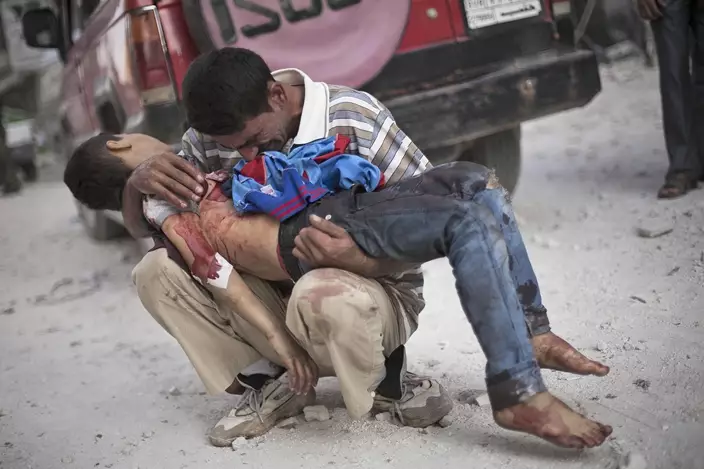
FILE - In this Oct. 3, 2012 file photo, Syrian man cries while holding the body of his son near Dar El Shifa hospital in Aleppo, Syria. For Syrians marking seven years of war this week, their country has never looked as helpless, fragmented and abandoned by the international community. (AP Photo/ Manu Brabo, File)
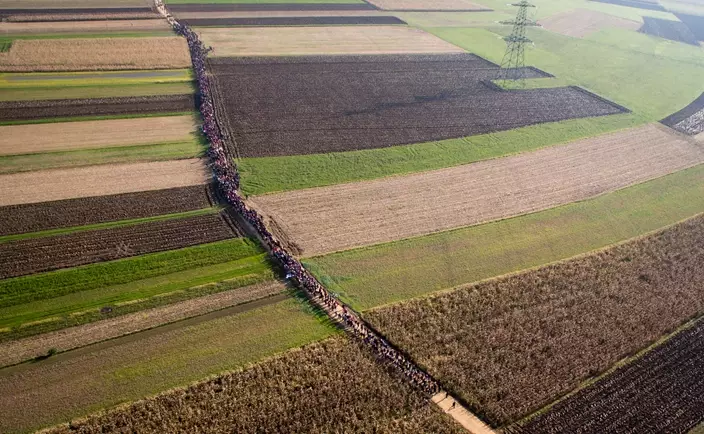
FILE - In this Oct. 25, 2015 file photo, shows a column of migrants, including Syrians, moving through fields after crossing from Croatia, in Rigonce, Slovenia. For Syrians marking seven years of war this week, their country has never looked as helpless, fragmented and abandoned by the international community. (AP Photo/Darko Bandic, File)
The protests spread across the country, and nearly everywhere they were met with batons and bullets. Within months, the protesters began taking up arms and the cycle of bloodshed accelerated.
Today, hopes of democratic Syria seem distant, as the rebellion has splintered and the violence has spawned extremism. The activists who organized the initial protests have been hunted down or driven out of the country, either by Syria's feared security agencies or the jihadis that haunt "liberated" areas.
Around 5 million Syrians have fled the country, with most of them struggling to get by in neighboring countries as donor fatigue worsens by the year.
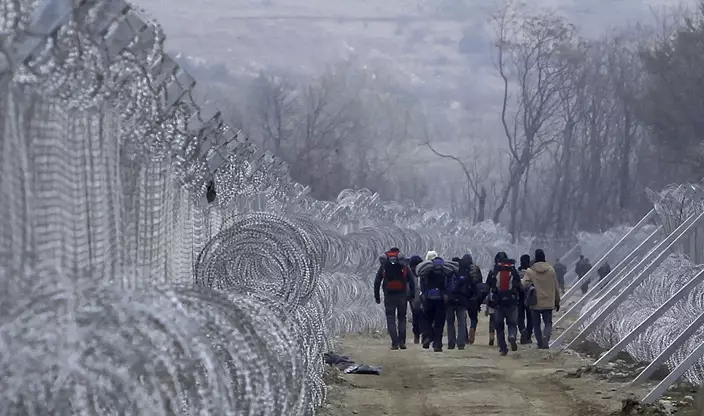
FILE - In this Feb. 29, 2016 file photo, refugees and migrants, including Syrians, who entered Macedonia from Greece illegally, walk between the two lines of the protective fence along the border line, near southern .(AP Photo/Boris Grdanoski, File)
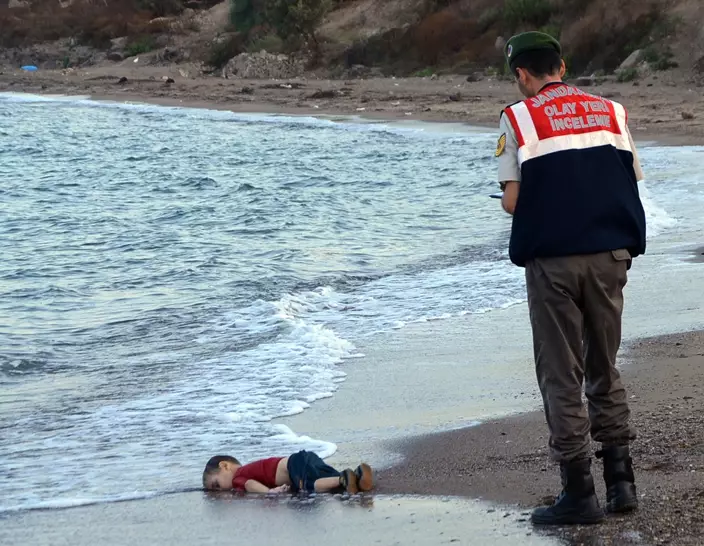
EDS NOTE: GRAPHIC CONTEN -- FILE - In this Sept. 2, 2015 file photo, a paramilitary police officer investigates the scene before carrying the body of Syrian 3-year-old Aylan Kurdi from the shore, near the beach resort of Bodrum, Turkey. (Nilufer Demir/DHA via AP, File) TURKEY OUT
"The thing that's new is that for most of the Syrians living outside, there's no more hope for return. Syria is no longer on their horizon," said the novelist Dima Wannous, who left Damascus for Beirut in 2011 and moved to London in 2016.
The defeat of the Islamic State group over the past year raised hopes of a broader resolution of the conflict. Instead, the fall of a common enemy has reignited older rivalries and freed up fighters for new battles.
Syria has redeployed its elite forces to the eastern Ghouta suburbs of Damascus, where they hope to eliminate the last rebel bastion on the edge of the capital with the aid of Russian air power. Airstrikes and shelling have killed more than 1,200 people in recent weeks despite a cease-fire adopted by the U.N. Security Council. Some 400,000 residents are trapped under a crippling siege, with many spending hours or days at a time crammed into makeshift underground shelters without water or electricity.
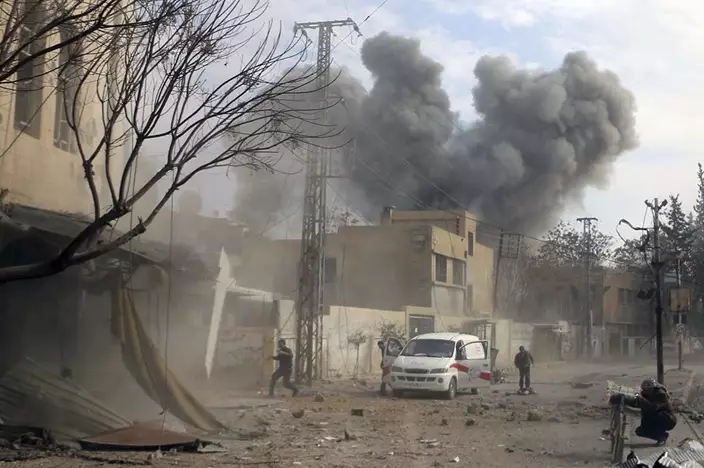
FILE - This file photo provided Feb. 8, 2018 by the Syrian Civil Defense White Helmets, which has been authenticated based on its contents and other AP reporting, shows a plume of smoke while civil defense workers arrive after airstrikes hit a rebel-held suburb near Damascus, Syria. (Syrian Civil Defense White Helmets via AP, File)
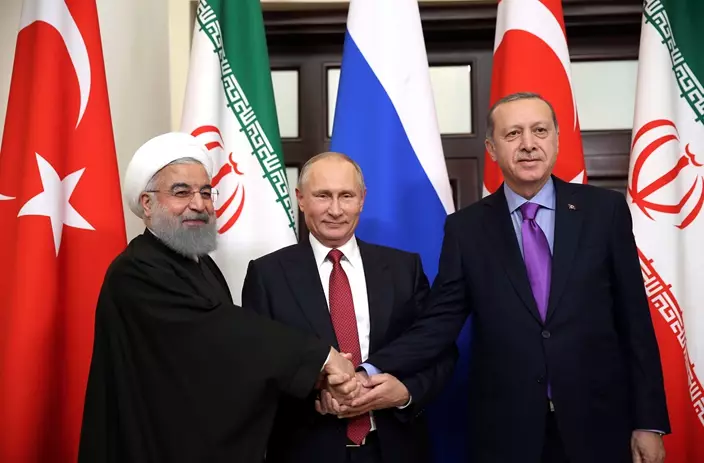
FILE - In this Nov. 22, 2017 file photo, Turkey's President Recep Tayyip Erdogan, right, Russia's President Vladimir Putin, center, and Iran's President Hassan Rouhani pose for the media members in Sochi, Russia. (Kayhan Ozer/Pool via AP, File)
In northern Syria, Turkey is battling a Syrian Kurdish militia that it views as an extension of the Kurdish insurgency within its own borders.
At least 10,000 civilians streamed out of eastern Ghouta to government-held territory Thursday, following a night of massive bombardment. Thousands more fled the Kurdish-held Afrin enclave in northern Syria, after Turkish forces tightened their siege around the town. The chaotic scenes broadcast on state-television reflected the deepening despair of ordinary Syrians.
The U.S., which is allied with both Turkey and the Kurds, has sought to defuse the tensions, to no avail. It isn't the first time the United States, which called on Assad to step down back in mid-2011, has found itself sidelined in Syria.
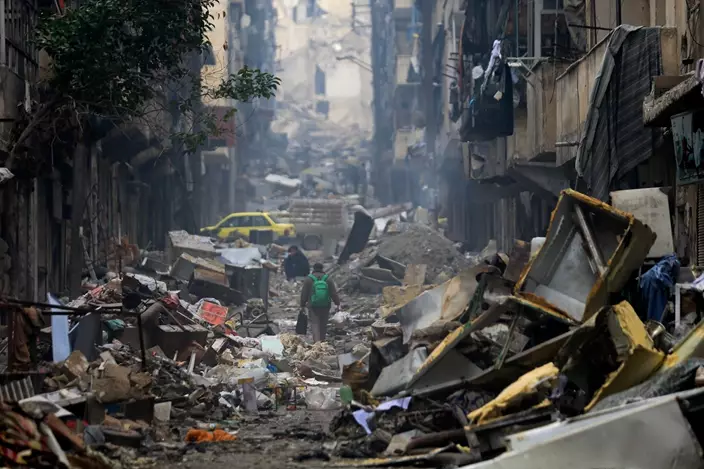
FILE - In this Jan. 20, 2017 file photo, residents walk through the rubble of the once rebel-held Salaheddine neighborhood in the eastern Aleppo, Syria. For Syrians marking seven years of war this week, their country has never looked as helpless, fragmented and abandoned by the international community. (AP Photo/Hassan Ammar, File)
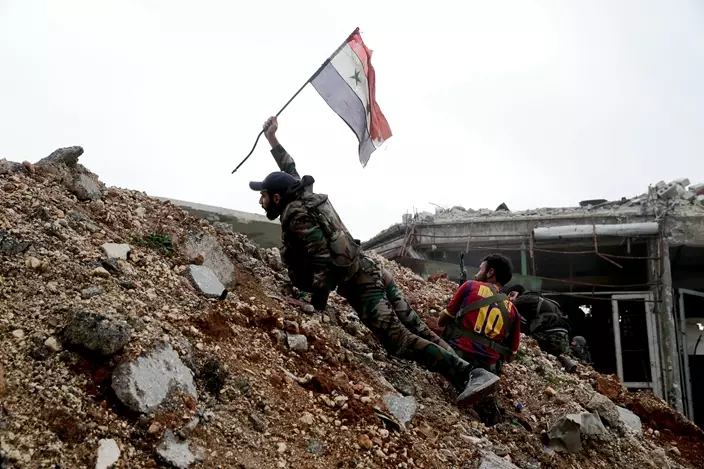
FILE - In this Dec. 5, 2016 file photo, a Syrian army soldier places a Syrian national flag during a battle with rebel fighters at the Ramouseh front line, east of Aleppo, Syria. (AP Photo/Hassan Ammar, File)
Hundreds of American special operations forces are deployed across northern and eastern Syria, where they are patrolling alongside a Kurdish-led force to prevent IS from regrouping.
But their footprint is nowhere near the size of Iran's. Thousands of Iran-backed fighters from Lebanon, Iraq and Afghanistan have set up a constellation of bases across the country, part of a corridor of arms and influence stretching from Tehran to the Mediterranean Sea — and Israel's doorstep.
Israel has carried out numerous air raids in Syria to prevent the transfer of arms to Hezbollah, and over the past year it has repeatedly warned against the growing Iranian presence. Syrian air defenses shot down an Israeli jet in February, the first time they are known to have done so since 1982.
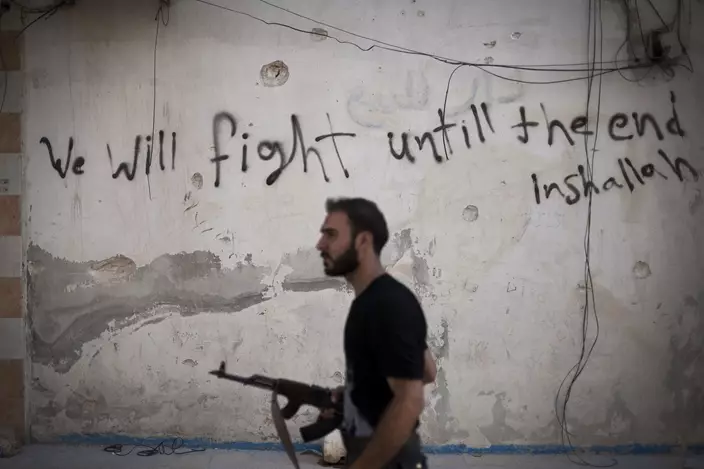
FILE - In this Sept. 10, 2012 file photo, a Free Syrian Army fighter walks through a street in the Amariya district in Aleppo, Syria. For Syrians marking seven years of war this week, their country has never looked as helpless, fragmented and abandoned by the international community. (AP Photo/ Manu Brabo, File)
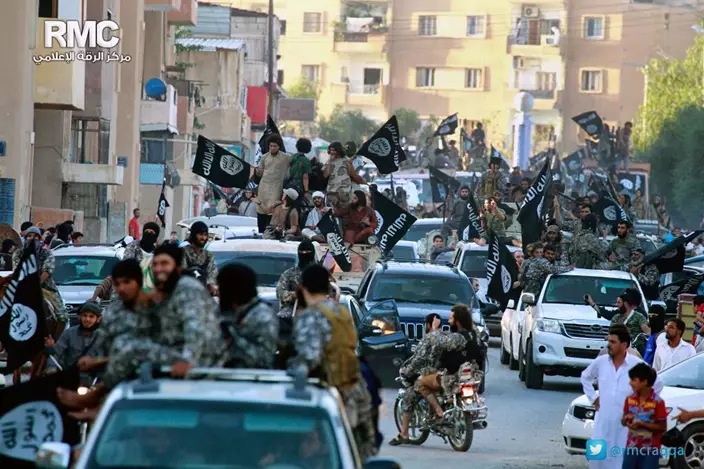
FILE - In this undated file photo posted on Monday, June 30, 2014, by the Raqqa Media Center of the Islamic State group, a Syrian opposition group, which has been verified and is consistent with other AP reporting, fighters from the Islamic State group parade in Raqqa, north Syria. (AP Photo/Raqqa Media Center of the Islamic State group, File)
Until now, the various foreign powers have been content to leave the fighting to their local proxies, but the risk of a direct confrontation — between Iran and Israel, or even Russia and the United States — has steadily grown.
"Tensions are rising in ways where the trigger becomes much easier to happen," said Maha Yahya, director of the Beirut-based Carnegie Middle East Center.
Syrians say their own country has become an afterthought.
"Syria has been swallowed up," says Wannous, the novelist. "In Syria you feel you no longer have a place, you no longer have a country."
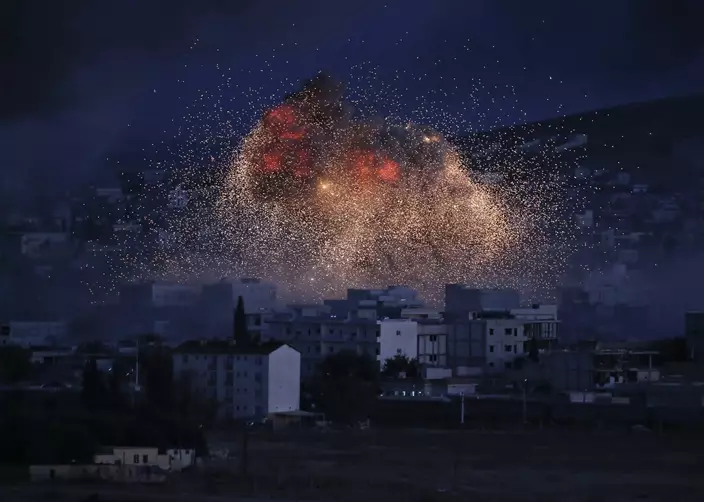
FILE - In this Oct. 20, 2014 file photo, thick smoke and flames erupt from an airstrike by the U.S.-led coalition in Kobani, Syria, as seen from a hilltop on the outskirts of Suruc, at the Turkey-Syria border. For Syrians marking seven years of war this week, their country has never looked as helpless, fragmented and abandoned by the international community. (AP Photo/Lefteris Pitarakis, File)
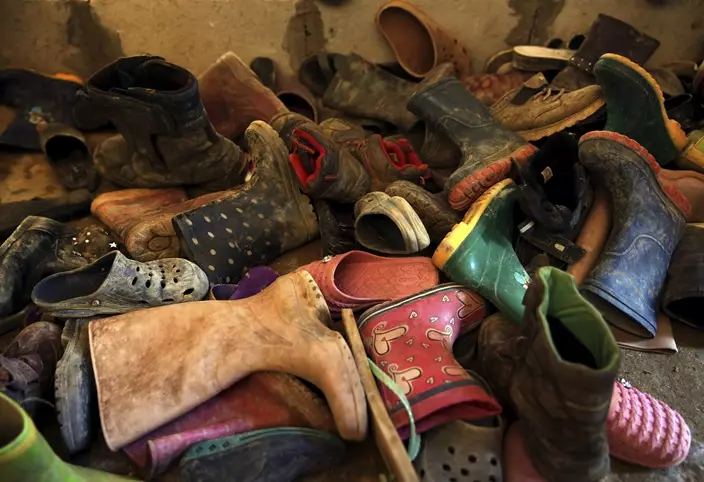
FILE - In this Jan. 27, 2016 file photo, shoes of Syrian refugee children lay on the ground at the entrance to a makeshift school in a tent, at a refugee camp in the village of Qab Elias, Bekaa Valley, Lebanon. For Syrians marking seven years of war this week, their country has never looked as helpless, fragmented and abandoned by the international community. (AP Photo/Bilal Hussein, File)



